University Business of Banking Assignment: Risk, Expansion, Basel III
VerifiedAdded on 2021/09/10
|6
|1039
|95
Homework Assignment
AI Summary
This assignment provides an analysis of various aspects of the business of banking. It begins by identifying and defining different types of risks banks face, including credit risk, market risk, operational risk, liquidity risk, and reputational risk. The assignment then explores two major concern areas and reform measures under Basel III, focusing on risk management and leverage. Furthermore, it examines the types of risks encountered by banks when considering international expansion, such as country risk, competition, currency volatility, and political instability. Finally, the assignment discusses the role and characteristics of offshore financial centers, along with their advantages and disadvantages, providing a comprehensive overview of key concepts in the banking industry.
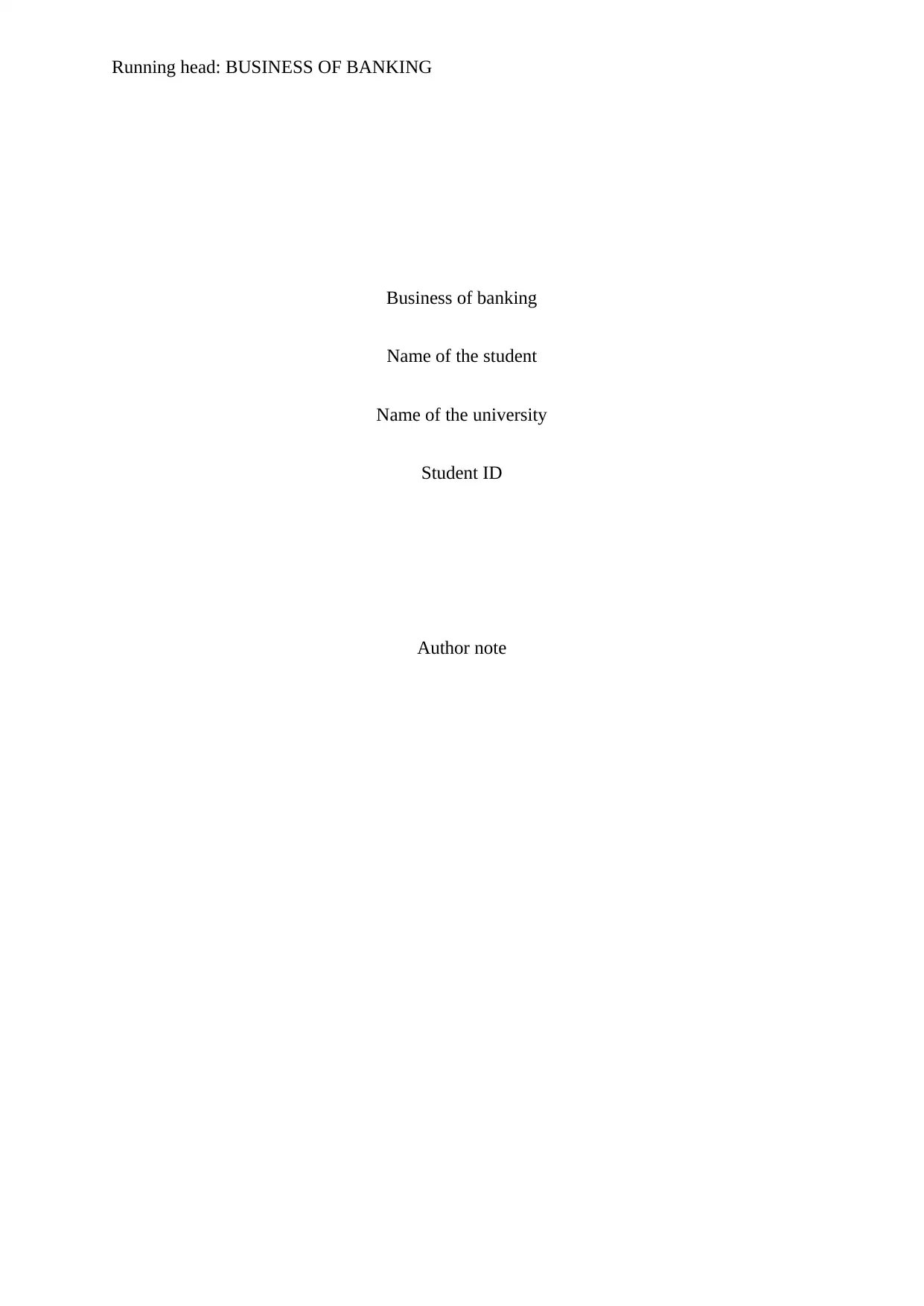
Running head: BUSINESS OF BANKING
Business of banking
Name of the student
Name of the university
Student ID
Author note
Business of banking
Name of the student
Name of the university
Student ID
Author note
Paraphrase This Document
Need a fresh take? Get an instant paraphrase of this document with our AI Paraphraser
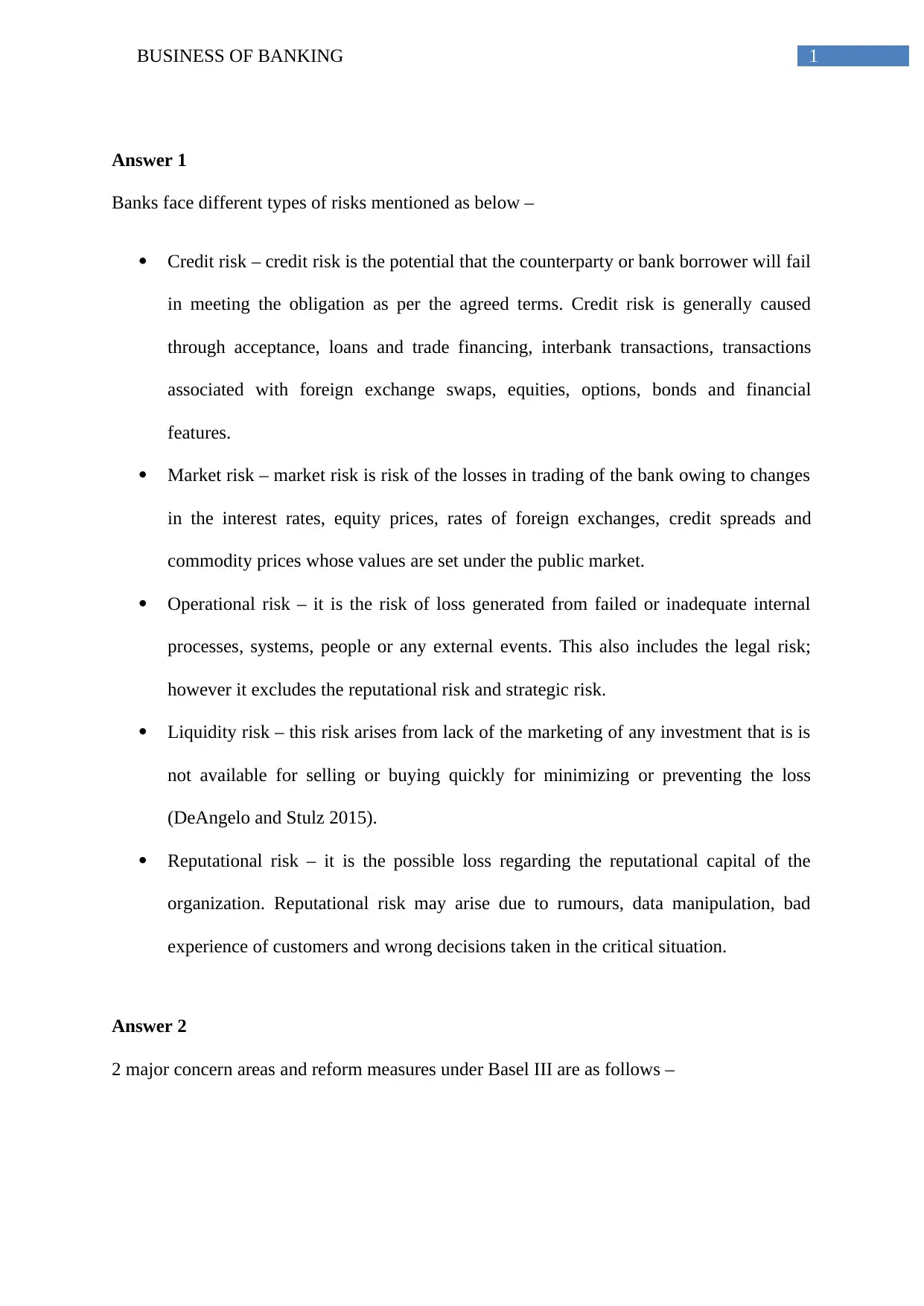
1BUSINESS OF BANKING
Answer 1
Banks face different types of risks mentioned as below –
Credit risk – credit risk is the potential that the counterparty or bank borrower will fail
in meeting the obligation as per the agreed terms. Credit risk is generally caused
through acceptance, loans and trade financing, interbank transactions, transactions
associated with foreign exchange swaps, equities, options, bonds and financial
features.
Market risk – market risk is risk of the losses in trading of the bank owing to changes
in the interest rates, equity prices, rates of foreign exchanges, credit spreads and
commodity prices whose values are set under the public market.
Operational risk – it is the risk of loss generated from failed or inadequate internal
processes, systems, people or any external events. This also includes the legal risk;
however it excludes the reputational risk and strategic risk.
Liquidity risk – this risk arises from lack of the marketing of any investment that is is
not available for selling or buying quickly for minimizing or preventing the loss
(DeAngelo and Stulz 2015).
Reputational risk – it is the possible loss regarding the reputational capital of the
organization. Reputational risk may arise due to rumours, data manipulation, bad
experience of customers and wrong decisions taken in the critical situation.
Answer 2
2 major concern areas and reform measures under Basel III are as follows –
Answer 1
Banks face different types of risks mentioned as below –
Credit risk – credit risk is the potential that the counterparty or bank borrower will fail
in meeting the obligation as per the agreed terms. Credit risk is generally caused
through acceptance, loans and trade financing, interbank transactions, transactions
associated with foreign exchange swaps, equities, options, bonds and financial
features.
Market risk – market risk is risk of the losses in trading of the bank owing to changes
in the interest rates, equity prices, rates of foreign exchanges, credit spreads and
commodity prices whose values are set under the public market.
Operational risk – it is the risk of loss generated from failed or inadequate internal
processes, systems, people or any external events. This also includes the legal risk;
however it excludes the reputational risk and strategic risk.
Liquidity risk – this risk arises from lack of the marketing of any investment that is is
not available for selling or buying quickly for minimizing or preventing the loss
(DeAngelo and Stulz 2015).
Reputational risk – it is the possible loss regarding the reputational capital of the
organization. Reputational risk may arise due to rumours, data manipulation, bad
experience of customers and wrong decisions taken in the critical situation.
Answer 2
2 major concern areas and reform measures under Basel III are as follows –
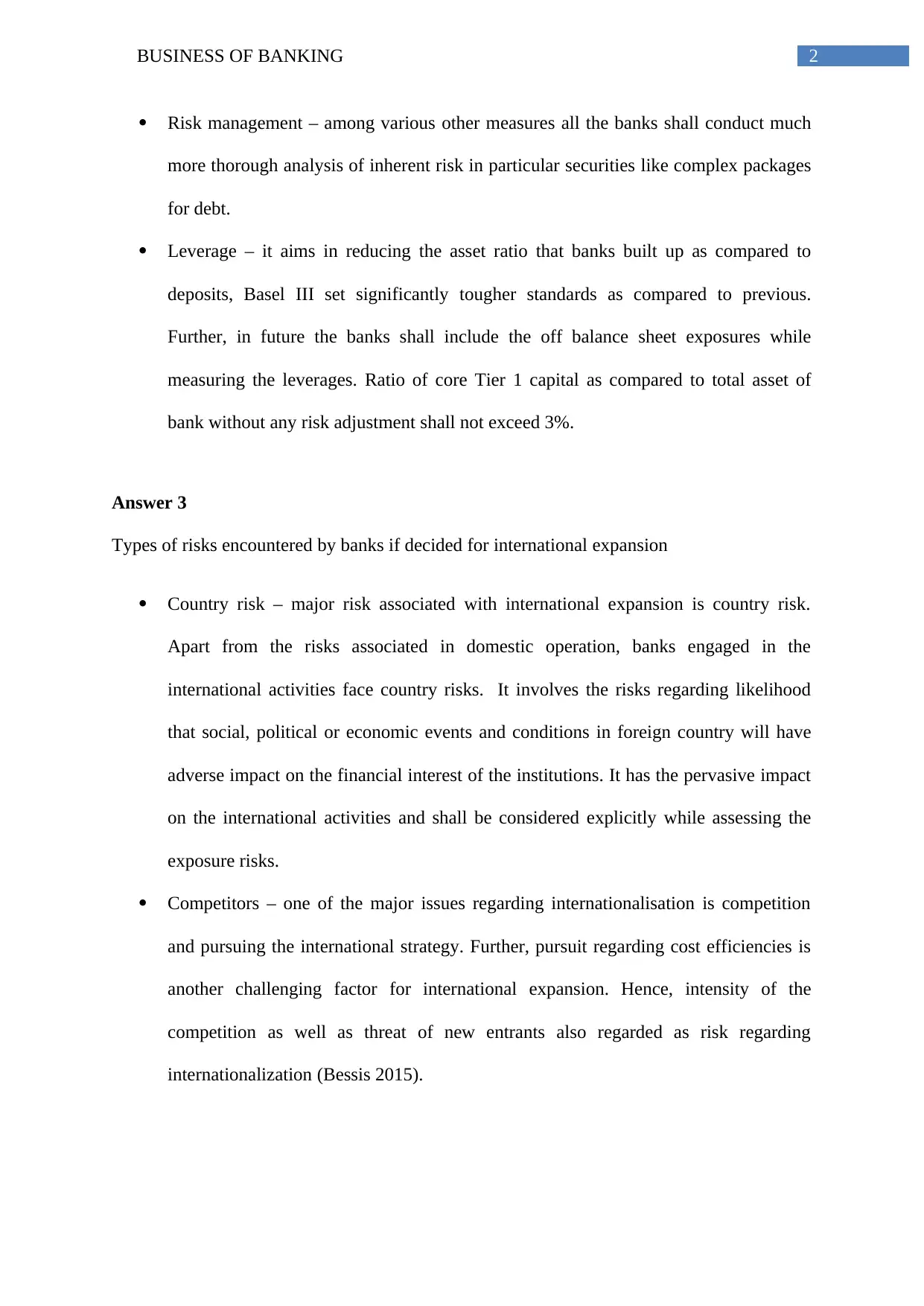
2BUSINESS OF BANKING
Risk management – among various other measures all the banks shall conduct much
more thorough analysis of inherent risk in particular securities like complex packages
for debt.
Leverage – it aims in reducing the asset ratio that banks built up as compared to
deposits, Basel III set significantly tougher standards as compared to previous.
Further, in future the banks shall include the off balance sheet exposures while
measuring the leverages. Ratio of core Tier 1 capital as compared to total asset of
bank without any risk adjustment shall not exceed 3%.
Answer 3
Types of risks encountered by banks if decided for international expansion
Country risk – major risk associated with international expansion is country risk.
Apart from the risks associated in domestic operation, banks engaged in the
international activities face country risks. It involves the risks regarding likelihood
that social, political or economic events and conditions in foreign country will have
adverse impact on the financial interest of the institutions. It has the pervasive impact
on the international activities and shall be considered explicitly while assessing the
exposure risks.
Competitors – one of the major issues regarding internationalisation is competition
and pursuing the international strategy. Further, pursuit regarding cost efficiencies is
another challenging factor for international expansion. Hence, intensity of the
competition as well as threat of new entrants also regarded as risk regarding
internationalization (Bessis 2015).
Risk management – among various other measures all the banks shall conduct much
more thorough analysis of inherent risk in particular securities like complex packages
for debt.
Leverage – it aims in reducing the asset ratio that banks built up as compared to
deposits, Basel III set significantly tougher standards as compared to previous.
Further, in future the banks shall include the off balance sheet exposures while
measuring the leverages. Ratio of core Tier 1 capital as compared to total asset of
bank without any risk adjustment shall not exceed 3%.
Answer 3
Types of risks encountered by banks if decided for international expansion
Country risk – major risk associated with international expansion is country risk.
Apart from the risks associated in domestic operation, banks engaged in the
international activities face country risks. It involves the risks regarding likelihood
that social, political or economic events and conditions in foreign country will have
adverse impact on the financial interest of the institutions. It has the pervasive impact
on the international activities and shall be considered explicitly while assessing the
exposure risks.
Competitors – one of the major issues regarding internationalisation is competition
and pursuing the international strategy. Further, pursuit regarding cost efficiencies is
another challenging factor for international expansion. Hence, intensity of the
competition as well as threat of new entrants also regarded as risk regarding
internationalization (Bessis 2015).
⊘ This is a preview!⊘
Do you want full access?
Subscribe today to unlock all pages.

Trusted by 1+ million students worldwide
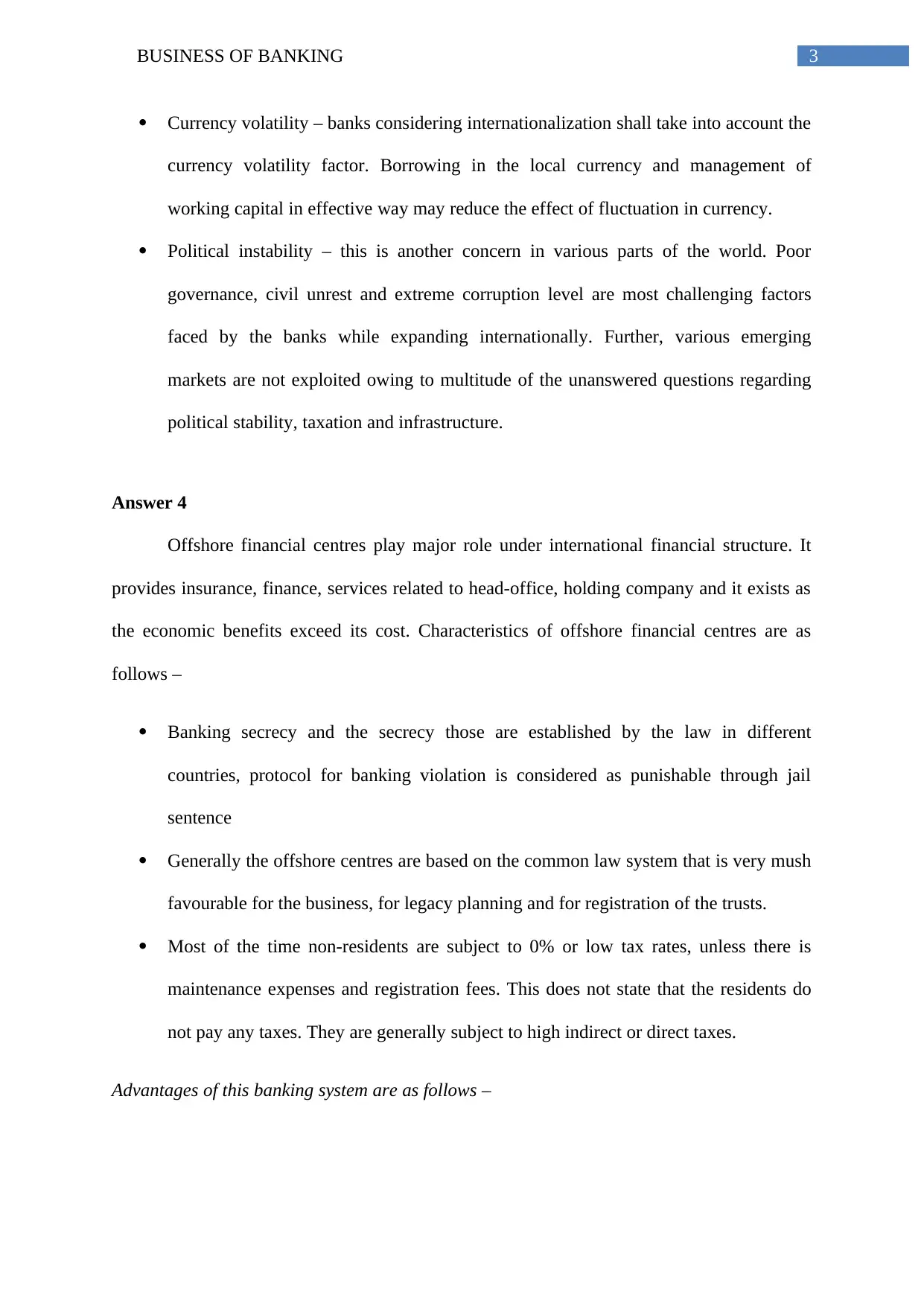
3BUSINESS OF BANKING
Currency volatility – banks considering internationalization shall take into account the
currency volatility factor. Borrowing in the local currency and management of
working capital in effective way may reduce the effect of fluctuation in currency.
Political instability – this is another concern in various parts of the world. Poor
governance, civil unrest and extreme corruption level are most challenging factors
faced by the banks while expanding internationally. Further, various emerging
markets are not exploited owing to multitude of the unanswered questions regarding
political stability, taxation and infrastructure.
Answer 4
Offshore financial centres play major role under international financial structure. It
provides insurance, finance, services related to head-office, holding company and it exists as
the economic benefits exceed its cost. Characteristics of offshore financial centres are as
follows –
Banking secrecy and the secrecy those are established by the law in different
countries, protocol for banking violation is considered as punishable through jail
sentence
Generally the offshore centres are based on the common law system that is very mush
favourable for the business, for legacy planning and for registration of the trusts.
Most of the time non-residents are subject to 0% or low tax rates, unless there is
maintenance expenses and registration fees. This does not state that the residents do
not pay any taxes. They are generally subject to high indirect or direct taxes.
Advantages of this banking system are as follows –
Currency volatility – banks considering internationalization shall take into account the
currency volatility factor. Borrowing in the local currency and management of
working capital in effective way may reduce the effect of fluctuation in currency.
Political instability – this is another concern in various parts of the world. Poor
governance, civil unrest and extreme corruption level are most challenging factors
faced by the banks while expanding internationally. Further, various emerging
markets are not exploited owing to multitude of the unanswered questions regarding
political stability, taxation and infrastructure.
Answer 4
Offshore financial centres play major role under international financial structure. It
provides insurance, finance, services related to head-office, holding company and it exists as
the economic benefits exceed its cost. Characteristics of offshore financial centres are as
follows –
Banking secrecy and the secrecy those are established by the law in different
countries, protocol for banking violation is considered as punishable through jail
sentence
Generally the offshore centres are based on the common law system that is very mush
favourable for the business, for legacy planning and for registration of the trusts.
Most of the time non-residents are subject to 0% or low tax rates, unless there is
maintenance expenses and registration fees. This does not state that the residents do
not pay any taxes. They are generally subject to high indirect or direct taxes.
Advantages of this banking system are as follows –
Paraphrase This Document
Need a fresh take? Get an instant paraphrase of this document with our AI Paraphraser
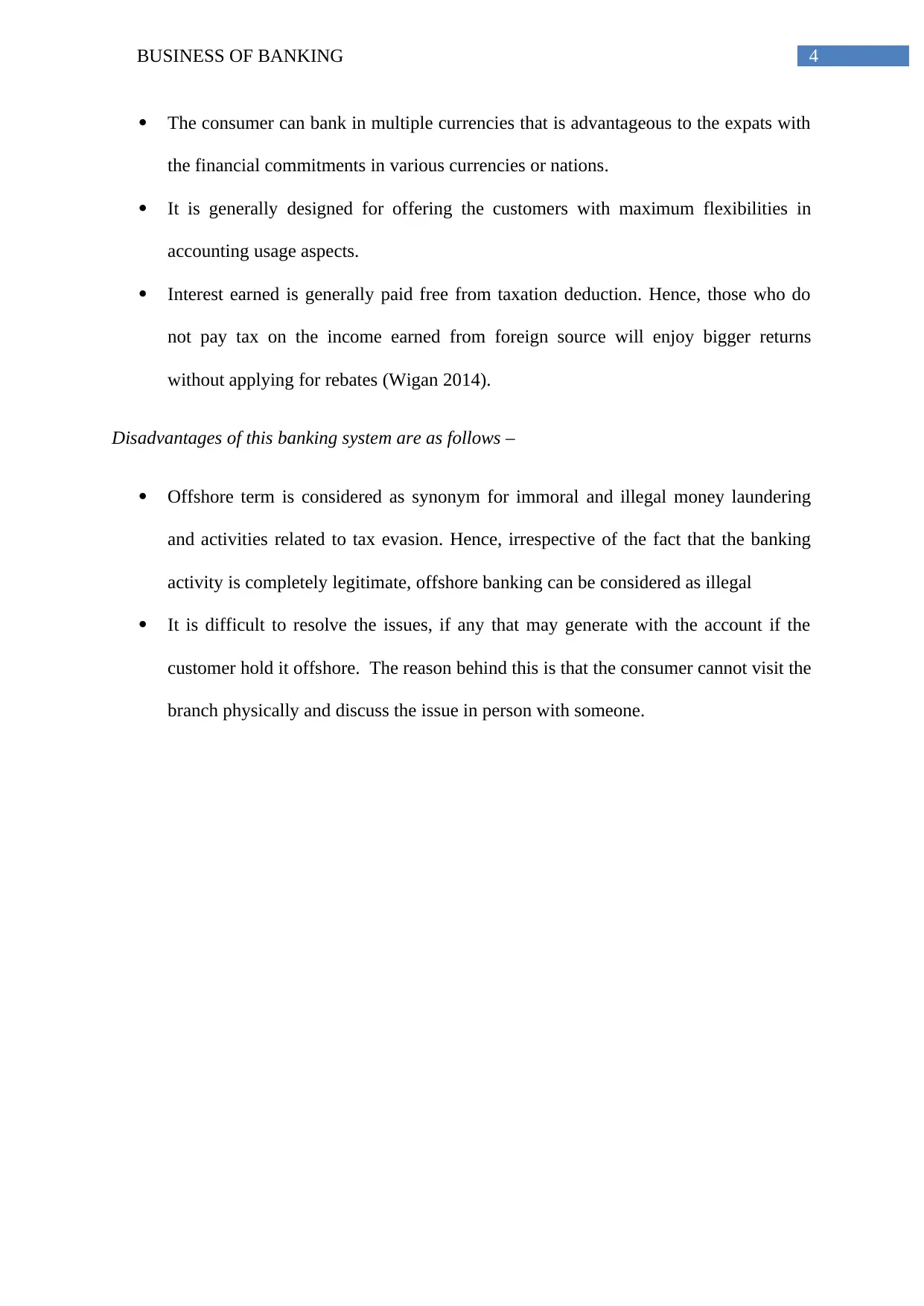
4BUSINESS OF BANKING
The consumer can bank in multiple currencies that is advantageous to the expats with
the financial commitments in various currencies or nations.
It is generally designed for offering the customers with maximum flexibilities in
accounting usage aspects.
Interest earned is generally paid free from taxation deduction. Hence, those who do
not pay tax on the income earned from foreign source will enjoy bigger returns
without applying for rebates (Wigan 2014).
Disadvantages of this banking system are as follows –
Offshore term is considered as synonym for immoral and illegal money laundering
and activities related to tax evasion. Hence, irrespective of the fact that the banking
activity is completely legitimate, offshore banking can be considered as illegal
It is difficult to resolve the issues, if any that may generate with the account if the
customer hold it offshore. The reason behind this is that the consumer cannot visit the
branch physically and discuss the issue in person with someone.
The consumer can bank in multiple currencies that is advantageous to the expats with
the financial commitments in various currencies or nations.
It is generally designed for offering the customers with maximum flexibilities in
accounting usage aspects.
Interest earned is generally paid free from taxation deduction. Hence, those who do
not pay tax on the income earned from foreign source will enjoy bigger returns
without applying for rebates (Wigan 2014).
Disadvantages of this banking system are as follows –
Offshore term is considered as synonym for immoral and illegal money laundering
and activities related to tax evasion. Hence, irrespective of the fact that the banking
activity is completely legitimate, offshore banking can be considered as illegal
It is difficult to resolve the issues, if any that may generate with the account if the
customer hold it offshore. The reason behind this is that the consumer cannot visit the
branch physically and discuss the issue in person with someone.
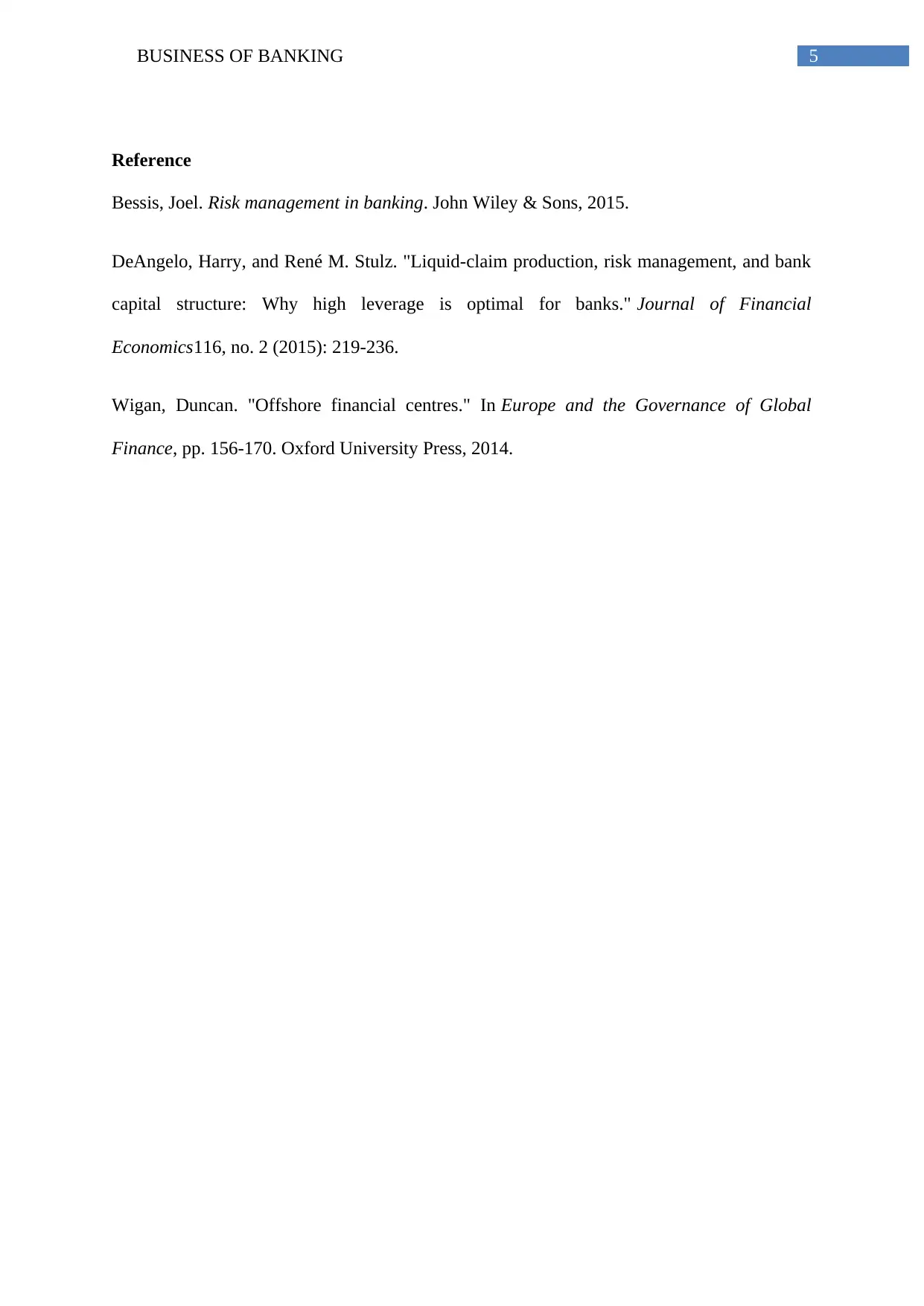
5BUSINESS OF BANKING
Reference
Bessis, Joel. Risk management in banking. John Wiley & Sons, 2015.
DeAngelo, Harry, and René M. Stulz. "Liquid-claim production, risk management, and bank
capital structure: Why high leverage is optimal for banks." Journal of Financial
Economics116, no. 2 (2015): 219-236.
Wigan, Duncan. "Offshore financial centres." In Europe and the Governance of Global
Finance, pp. 156-170. Oxford University Press, 2014.
Reference
Bessis, Joel. Risk management in banking. John Wiley & Sons, 2015.
DeAngelo, Harry, and René M. Stulz. "Liquid-claim production, risk management, and bank
capital structure: Why high leverage is optimal for banks." Journal of Financial
Economics116, no. 2 (2015): 219-236.
Wigan, Duncan. "Offshore financial centres." In Europe and the Governance of Global
Finance, pp. 156-170. Oxford University Press, 2014.
⊘ This is a preview!⊘
Do you want full access?
Subscribe today to unlock all pages.

Trusted by 1+ million students worldwide
1 out of 6
Related Documents
Your All-in-One AI-Powered Toolkit for Academic Success.
+13062052269
info@desklib.com
Available 24*7 on WhatsApp / Email
![[object Object]](/_next/static/media/star-bottom.7253800d.svg)
Unlock your academic potential
Copyright © 2020–2026 A2Z Services. All Rights Reserved. Developed and managed by ZUCOL.





